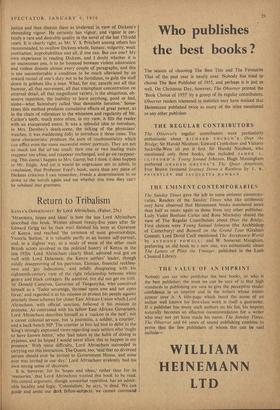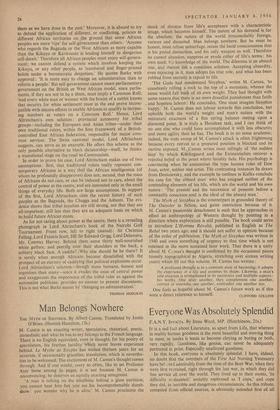Return to Tribalism
KENYA'S OPPORTUNITY. By Lord Altrincham. (Faber, 25s.) 'MEMORIES, hopes and ideas' is how the late Lord Altrincham described this book. Written almost twenty-five years after Sir Edward Grigg (as he then was) finished his term as Governor of Kenya, and reached 'the terminus of most governorships, Victoria Station,' it is valuable partly as an honest self-portrait, and, in a slighter way, as a study of some of the other main British actors involved in the political history of Kenya in the late 1920s. Lord Altrincham clearly liked, admired and got on well with Lord Delamere, the Kenya settlers' leader, though mildly disapproving of his patrician, Etonian, financial reckless- ness and 'gay indecorum,' and mildly disagreeing with his eighteenth-century view of the right relationship between white gentry and black cottagers. He admired, but did not get on with. Sir Donald Cameron, Governor of Tanganyika. who conceived himself as a 'Tudor sovereign, throned upon awe and not upon force,' and regarded it as his mission to protect his people against precisely those schemes for closer East African Union which Lord Altrincham, with official sanction, believed it his mission to promote. AS contrasted with his fellow East African Governors, Lord Altrincham, describes himself as a 'cuckoo in the hest'; not a career colonial servant, but 'a journalist, a soldier, a courtier,' and a back-bench MP. The courtier in him led him to defer to the King's strongly expressed views regarding male settlers who 'ought to have known better,' who 'had taken tq the habit of dining in pyjamas, and he hoped I would never allow this to happen in my presence.' With some difficulty, Lord Altrincham. succeeded in carrying out this instruction. The Queen, too, 'said that no divorced person should ever be invited to Government House, and none ever was invited in our day.' Lord Altrincham evidently had his own strong sense of decorum.
It is, however, for its 'hopes and ideas,' rather than for its 'memories,' that Lord Altrincham wanted this hook to be read. His central argument. though somewhat repetitive, has an admir- able lucidity and logic. 'Colonialism,' he says, 'is dead. We can guide and assist our dark fellow-subjects; we cannot command
them as we have done in the past.' Moreover, it is absurd to try to defend the application of different, or conflicting, policies in different African territories on the ground that some African peoples are more 'ripe' for self-government than others: 'Anyone who regards the Baganda or the West Africans as more capable than the Kikuyu or Kavirondo is lending himself to dangerous self-deceit.' Therefore all African peoples must enjoy self-govern- ment; we cannot defend a system which involves keeping the Kikuyu, or any other people, as 'numbered and finger-printed helots under a bureaucratic despotism.' He quotes Burke with approval: 'It is more easy to change an administration than to reform a people.' But self-government cannot mean parliamentary government on the British or West African model, since parlia- ments, if they are not to be a sham, must imply a Common Roll; 'and every white man or woman with the brains of a rabbit knows that security for white settlement must in the end prove incom- patible with sincere efforts to enable Africans.to qualify in increas- ing numbers as voters on a Common Roll.' Hence, Lord Altrincham's own solution : provincial autonomy for tribal groups—including the European and Asian tribes—under their own traditional rulers, within the firm framework of a British- controlled East African federation, responsible for major com- mon services. The Swiss cantonal model, Lord Altrincham suggests, can serve as an example. He offers this scheme as the only possible alternative to black dictatorship—itself, he thinks. a transitional stage on the road to. Communism.
In order to prove his case, Lord Altrincham makes use of two assumptions: first, that traditional rulers really represent con- temporary Africans in a way that the African intelligentsia (of whom he profoundly disapproves) does not; second, that the mass of Africans do not care, or can be induced not to care, about the control of power at the centre, and are interested only in the small things of everyday life. Both are large assumptions. In support of the first, Lord Altrincham cites the recent history of such peoples as the Baganda, the Chagga and the Ashanti. The evi- dence shows that tribal loyalties are still strong, not that they are all-important; still less that they are an adequate basis on which to build future African states.
As for not caring about power at the centre, there is a revealing photograph in Lord Altrincham's book of the Nairobi Golf Tournament. Front row, left to right (seated): Sir Christian Felling, Lord Francis Scott, HE Sir Edward Grigg, Lord Delamere, Mr. Conway Harvey. Behind them some thirty well-nourished white golfers; and peeriAg over their shoulders at the back, a solitary black face. A caddie?.Why else should he be there? It is surely when enough Africans become dissatisfied with the prospect of an eternity of caddying that political explosions occur. Lord Altrincham's solution—though more humane, 'honest and ingenious than many—since it evades the issue of central power and exaggerates the importance of the tribal ruler as against the nationalist politician, provides no answer to present discontents. This is not what Burke meant 1:q) 'changing an administration.'
THOMAS HODGKIN



































 Previous page
Previous page